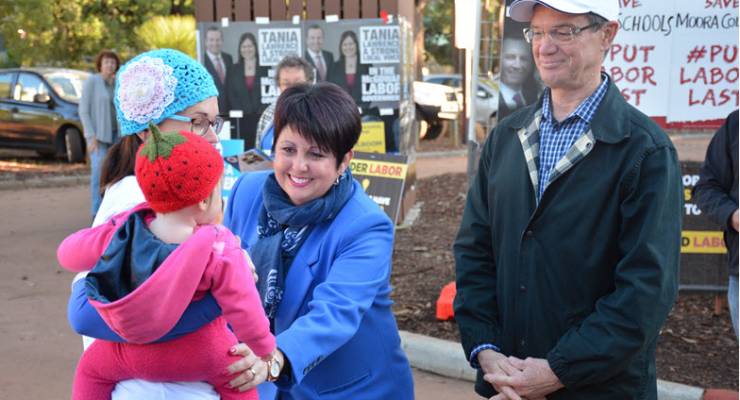
At a time when both sides of federal politics have byelections on the brain, the Turnbull government will be enjoying a modest morale boost after the Liberals’ clear victory in a Labor-held state seat in Western Australia on Saturday.
After falling to Labor with the rout of Colin Barnett’s government in March 2017, the Perth fringe seat of Darling Range returned to the Liberal fold after a swing of nearly 10% to Liberal candidate Alyssa Hayden, a former state upper house MP who unexpectedly lost her seat at the state election to One Nation.
The stakes in Darling Range were particularly high for the Liberals, given their determination to recover the naturally conservative-leaning seat was used as their excuse for forfeiting the looming section 44 byelections in the federal seats of Perth and Fremantle.
As such, sighs of relief emanated from party headquarters on Saturday as it became apparent that the party had lined up a swing more than sufficient to account for a Labor margin of 5.8%.
The defeat is certainly sobering for the McGowan government, and no doubt reflects the gloss it lost after a tough post-election budget added further to the crippling burden of power prices.
However, the Liberals should not delude themselves; while the swing is above par for a byelection held under ordinary circumstances, it compares unfavourably with those that followed blowout state election results in New South Wales in 2011 and Queensland in 2012.
The Liberals could hardly have been presented with more auspicious circumstances at the byelection, which arose from the revelation that outgoing Labor member Barry Urban’s CV had largely been a work of fiction — a difficulty compounded when Labor’s initial pick to succeed him, Colleen Yates, withdrew when it emerged she had gilded a few lilies on her LinkedIn profile.
Without such advantages at the next election in 2021, it remains difficult to see how the Liberals can rebuild to the extent required to be competitive — particularly under the leadership of Mike Nahan, who will be 70 years old by the time of the election, and would lack electoral appeal even if he weren’t afflicted with an American accent.
That the Liberals have no obviously superior option among their parliamentary ranks emphasises the dearth of parliamentary talent that afflicted the Barnett government, particularly after Christian Porter flew the coop for Canberra.
Parliamentary neophyte Zak Kirkup is a name to watch for the future, but at 31 years of age he would be mindful of the cautionary tale of Matt Birney from the Liberals’ last period in opposition, whose promising career flamed out after he ascended to the leadership at 35.
So far as federal implications go, those wishing to parse the result for portents ahead of the Super Saturday byelections on July 28 should probably direct their energies elsewhere.
The truth about byelections is that so many variables are in play that it’s hard to draw lessons in any but the most extreme cases, and the result in Darling Range, emphatic though it was, was not dramatic enough to qualify.
However, there is one lesson of relevance to the federal sphere — don’t put much too stock in the polls.
The Darling Range result offers yet more evidence that pollsters do a lot less well in seat polling than when zooming out to state and national level, which appears to be as true of party internal polling as that conducted for the media.
The one media poll for the byelection was conducted nine days before polling day by ReachTEL for The West Australian, and it landed way off the mark in finding Labor facing only the most negligible of swings.
What’s more, the result appeared to be corroborated by polling circulated by Labor in the final days of the campaign, which credited the party with 38% of the primary vote — a decisive 6% north of where they actually landed.
The scale of the disparity may not be enough to offer hope to Liberal candidate Georgina Downer in Mayo, who is trailing Rebekha Sharkie in the latest ReachTEL poll by fully 62% to 38% — well beyond the error range of even the worst performing poll.
However, it would be dangerous to read much into the 50-50 result in ReachTEL’s latest byelection poll for the Queensland seat of Longman — or indeed into Graham Richardson’s assertion in The Australian today that Labor insiders believe, based on what they think they know, that their party is headed for defeat in the Tasmanian seat of Braddon.








Why anyone gave a job to that corrupt loser, Richardson, is totally beyond me…….but this is Murdoch we’re talking about, so I’m sure its that corruption that made Richo so attractive to Uncle Rupert. Last I checked, Richardson is a card-carrying Liberal Party member in all but name.
It would be the sweetest of results to see Sharkie hold her seat against the entrenched tory entitlement syndrome and see the back of this latest example of the idiot scion of the IPA squatocracy.
‘….ReachTEL…. landed way off the mark in finding Labor facing only the most negligible of swings.’
That poll result was illogical. The byelection was caused by a Labor MP’s flagrant dishonesty being exposed, then the replacement ALP candidate appeared less than truthful. Inevitably voters would shy away from a party so inept at choosing duds, common sense would’ve predicted it.
should read: ‘so skilled’ at choosing duds